A Quote by Jerome Powell
Given that trade benefited the Asian economies on the way up, it seems natural that the slowdown in global trade, whatever its causes, could lead to some loss of dynamism and growth in the region.
Related Quotes
[Barack] Obama, for example, he has not given up on cap-and-trade. Now, he has not been able to pass cap-and-trade, but cap-and-trade is all about redistribution of wealth in a global basis - taking money out of this country and giving it to third-world countries on the other end of the ocean. And that is redistribution of wealth in a global basis. It's fundamental Marxism.
More broadly, Prime Minister Lee [Hsien Loong] and I will work to advance the US-Singapore partnership across the board. We're committed to sustaining the dynamism of our economies with the Trans-Pacific Partnership - the highest-standard trade agreement ever - which will support trade and innovation in both our countries.
The far more likely Trump scenario is this: Chinese leaders realize they no longer have a weak leader in the White House; China ceases its unfair trade practices. America's massive trade deficit with China comes peacefully and prosperously back into balance, and both the U.S. and Chinese economies benefit from trade.
My experience with novice traders is that they trade three to five times too big. They are taking 5 to 10 percent risks on a trade when they should be taking 1 to 2 percent risks. The emotional burden of trading is substantial; on any given day, I could lose millions of dollars. If you personalize these losses, you can’t trade.
































